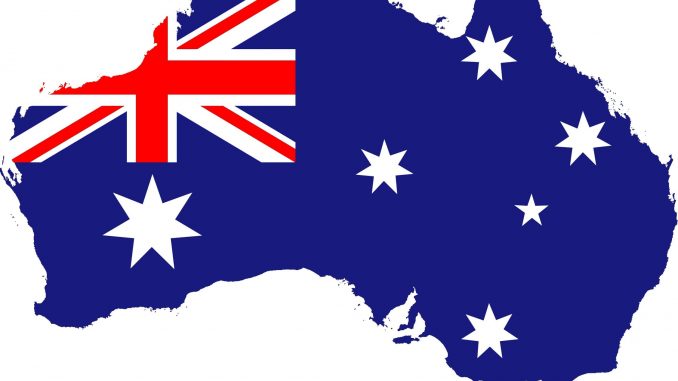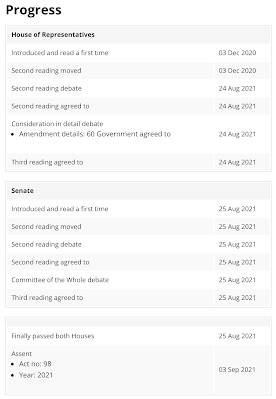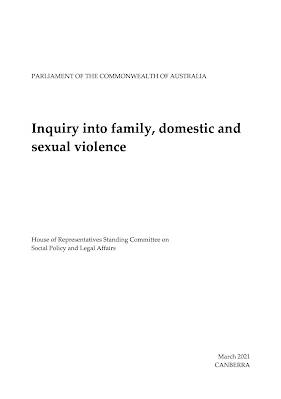
Australia is rapidly becoming the "poster boy" for full-on totalitarianism. A recent law is a particularly egrigious example of where the world is headed under the guise of defeating a virus.
Here is a summary of the Surveillance Legislation Amendment (Identify and Disrupt) Bill 2021:
"Amends: the Surveillance Devices Act 2004 and Telecommunications (Interception and Access) Act 1979 to: introduce data disruption warrants to enable the Australian Federal Police (AFP) and the Australian Criminal Intelligence Commission (ACIC) to disrupt data by modifying, adding, copying or deleting data in order to frustrate the commission of serious offences online; and make minor technical corrections; the Surveillance Devices Act 2004 to introduce network activity warrants to enable the AFP and ACIC to collect intelligence on serious criminal activity by permitting access to the devices and networks used to facilitate criminal activity; the Crimes Act 1914 to: introduce account takeover warrants to enable the AFP and ACIC to take over a person's online account for the purposes of gathering evidence to further a criminal investigation; and make minor amendments to the controlled operations regime to ensure controlled operations can be conducted effectively in the online environment; and 10 Acts to make consequential amendments."
Here is a summary of the three new types of surveillance warrants which grant the Australian Federal Police (AFP) and the Australian Criminal Intelligence Commission (ACIC) unfettered powers to deal with "online crime":
1.) Data disruption warrant: gives the police the ability to "disrupt data" by modifying, copying, adding, or deleting it.
2.) Network activity warrant: allows the police to collect intelligence from devices or networks that are used, or likely to be used, by those subject to the warrant
3.) Account takeover warrant: allows the police to take control of an online account (e.g. social media) for the purposes of gathering information for an investigation.
Basically, Australia's parliamentarians have granted the AFP and ACIC the right to modify, copy, add or delete your data if you become a suspect during the investigation of crime. It is also important to note that there is no judicial oversight to the issuance of warrants.
While politicians claim that the legislation is needed to battle terrorism and child exploitation, as you can see, the law covers a broad range of offences. According to the Human Rights Law Centre in Melbourne, here are some of the offences for which Data Disruption Warrants and Network Activity Warrants warrants may be sought including:
1.) any Commonwealth offence punishable by a maximum term of imprisonment of 3 years or more; and
2.) any State offence with a federal aspect punishable by a maximum term of imprisonment of 3 years or more.
Similarly, the Account Takeover Warrant may be issued in relation to:
1.) any Commonwealth offence punishable by imprisonment for 3 years or more that involves a wide-ranging list of matters, from violence and theft to tax evasion, bankruptcy violations and misuse of a computer; and
2.) any State offence that has a federal aspect and that would be a serious Commonwealth offence if it were a Commonwealth offence.
Note that the final offence includes just about any state offence that has a federal aspect.
The broadness of these definitions mean that Warrants can be used to target minor criminal activities including those who are acting in the public interest (i.e. whistleblowers or journalists). Warrants can also be used in the following circumstances:
1.) a person posts content on social media that is deemed menacing, harassing or offensive.
2.) a person dishonestly takes, conceals or tampers with post
3.) a person dishonestly obtains cheaper internet
4.) a person marries two other people
5.) a person alters a registered trade mark without permission
6.) a person owns a whale or dolphin that has been unlawfully imported
7.) a person organises a protest activity involving breaking into a farm
8.) a whistleblower communicates information obtained under a surveillance warrant in a way that prejudices an investigation
9.) a whistleblower discloses information relating to the "assistance and access" regime in the Telecommunications Act
10.) a lawyer or journalist assists a government whistleblower to uncover wrongdoing, in a manner deemed to constitute "incitement"
Network Activity Warrants can be applied against any person in a group of individuals that are considered to be "a criminal network of individuals" who are connected electronically. This means that two or more people who are using the same electronic service (i.e. any website) or who communicate with other individuals in the group electronically can have a warrant applied to them.
The bill just received Royal Assent (the final stage of approval when a bill becomes a law) as shown here:
As though all of this weren't bad enough, an Australian parliamentary committee report from March 2021 which studied family, domestic and sexual violence as shown here:
….recommended the following (bolds are mine):
The Committee makes the additional following recommendations relating to technology-facilitated abuse:
1.) There should be greater acknowledgement that appropriate technology use is a shared community responsibility. It is not simply a responsibility of platforms to host and police content.
2.) There should be greater clarity around a platform’s obligation to remove content, including through the Online Safety Act.
3.) In order to open or maintain an existing social media account, customers should be required by law to identify themselves to a platform using 100 points of identification, in the same way as a person must provide identification for a mobile phone account, or to buy a mobile SIM card.
4.) Social media platforms must provide those identifying details when requested by the eSafety Commissioner, law enforcement or as directed by a court.
5.) The Government should consider regulating to enable law enforcement agencies to access a platform’s end-to-end encrypted data, by warrant, in matters involving a threat to the physical or mental wellbeing of an individual or in cases of national security.
6.) There should be a substantial increase in criminal and civil penalties for technology-facilitated abuse to act as a greater deterrent for errant behaviour.
7.) All government hosted websites and applications should have readily available (and searchable) avenues where a victim-survivor of technology-facilitated abuse can seek assistance to have abusive material removed expeditiously.
So, not only does the Australian government want to know what is being said, they want to know who said it, particularly on social media platforms. With social media platforms being among the world's largest collectors of personal data, this is an extremely concerning development. As well, these two issues bring us one step closer to a social credit score as is in place in China – say the wrong thing to the wrong people and your score drops.
Surveillance and a lack of anonymity are power and governments know that no matter what excuses they use to reduce our freedoms, such as they are in today's totalitarian society. Australia is proving to be the test case when it comes to how governments will control the useless masses under the developing technocratic, totalitarian world order. Given the fact that most politicians are not original thinkers, we can assure ourselves that similar legislation is about to be unleashed on the citizenry of other nations like Canada, New Zealand, the United States, the United Kingdom and others.
You can publish this article on your website as long as you provide a link back to this page.



Be the first to comment